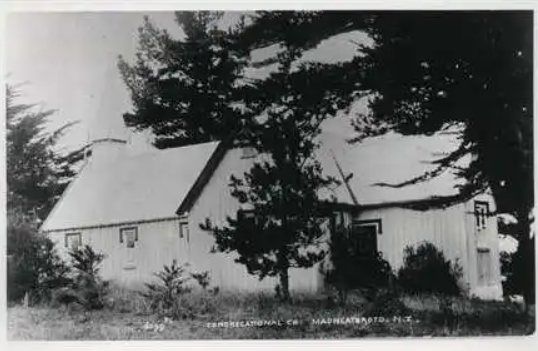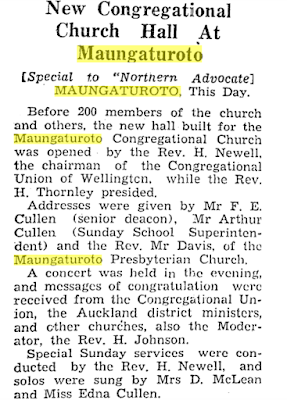 |
| Photo from Auckland Museum Collections |
 |
| from Northern Advocate 21 October 1937 |
These days this is how the church now looks - image from google maps.
Maungaturoto will be celebrating 150 Years in 2013
 |
| Photo from Auckland Museum Collections |
 |
| from Northern Advocate 21 October 1937 |
I have to wonder based on similar accidents and events from today whether alcohol was involved.
CAR GOES OVER BANK.: ONE PASSENGER KILLED. TWO MEN IN HOSPITAL [BY TELEGRAPH. —OWN CORRESPONDENT.] WHANGAREI, Monday.
A fatal motoring accident occurred at Maungaturoto late on Saturday afternoon.
Details are:— Killed Mr. Lionel M. Hardy, aged 24, a member of the refreshment room staff of the New Zealand Railways, Auckland.
Injured. Mr. John Dodds, of Huarau, aged 60, extensive injury to scalp. Mr. Alfred King, of Maungaturoto; fractured ribs and injuries to right side. The two other occupants of the car, Messrs. Williams and Peacock, also of the railway refreshment room staff, were not sufficiently injured to warrant admission to hospital.
For some years Mr. Hardy was a well known member of the Maungaturoto railway refreshment room staff, and was transferred to Auckland six weeks ago. He was single, and as far as is known had no relatives in New Zealand. He had come to pay a weekend visit to friends at Maungaturoto.
The car in which the party of five was travelling was driven by Mr. Dodds, and was travelling down the steep siding in the vicinity of the Maungaturoto public hall at about 5.30 p.m., when it left the road, plunged over a sloping bank 5ft. high, and capsized. Evidently Mr. Hardy was crushed against a log or some hard obstacle and was terribly injured. He was alive when removed from the wreckage, and was attended to by Dr Dawson, but died half an hour before the Whangarei Hospital was reached at 8.15 p.m.
Mr. Dodds injuries lead to the conclusion that his head came in contact with the windscreen, but both he and Mr. King are progressing satisfactorily. The inquest into Mr. Hardy's death was opened at the hospital before Mr. G. N. Morris, S.M., yesterday, and. after medical testimony and evidence, of identification had been given, was adjourned to Maungaturoto on January 16.
New Zealand Herald, Volume LXVI, Issue 20440, 17 December 1929, Page 12
The service car usually run by Mr Lough between Whangarei and Waipu, went over a bank in the Waipu Gorge on Tuesday evening and was badly smashed. Fortunately no injury was sustained by either of the passengers. Trouble occurred, and while Mr. Lough and a companion were rectifying it, the car slipped over the bank, dropping over 100 feet into nine feet of water. At present only the spot light and part of the bonnet are showing above the surface and recovery of the car will probably be difficult.
Arising out of the destruction of a motor car in the Maungaturoto Gorge on March 30 last, four men were charged in the Maungaturoto Police Court today that on March 30 they did wilfully commit mischief by night, iv that they wilfully damaged a car valued at £280, the property of A. S. Bevin and Co., Ltd. Also that at Waipu they conspired, by fraudulent means, to defraud the Oceanic Accident Corporation Company by causing the car to be wilfully wrecked, with intent of claiming an amount of insurance. The accused were Francis Saville Lough, William Ewald Hyber, William John Forshaw, and John Wilson Reynolds. Evidence was given by Allister Stuart Bevin. of A. S. Bevin and Co., Whangarei, that on March 28, 1925, he sold the accused Lough a motor car on the hire purchase system. A promissory note in this connection, with three days grace was clue on March 31, 1926. The insurance expired on March 28, two days prior to the car being destroyed. On April 1 witness saw Lough, who said he was under the impression that the insurance expired on March 31.
Murdoch Luther McLeod. taxi proprietor, of Waipu, related that he rang Lough up, asking for a loan of his car, as he had had an accident to his own. Witness did not. know how long he would want the car. Lough said when witness finished with it to "push it over the gorge." Witness thought it a joke, and said, "What's the idea —big insurance on her?" Lough said, "Yes, I have about £300 on her.' Witness then said: I will leave the pushing over to you." The police produced statements made by accused, and said they had been frank and truthful on the whole matter. After hearing the evidence, Lough pleaded guilty and was committed to the Supreme Court for sentence. The other three accused pleaded not guilty reserved their defence and were committed for trial.
A novel, but extremely unfortunate means of obtaining insurance on a motor car in order to pay liabilities was adopted by a man recently, but it was found that when he had pushed the motor car. over a cliff that the insurance policy had lapsed two days prior to the "accident." He was apprehended and pleaded guilty, but three men who were concerned in the matter were also arrested.
William Ewald Heyber and William John Forshaw yesterday stood their trial on charges of wilful damage to a motor car and with conspiring to defraud an insurance company at Maungaturoto. John Wilson Keynolds, who was also implicated in the matter was discharged as the grand jury returned a no bill in his case. Mr. V. R. Meredith, prosecuted, and Mr. Luxford appeared for Heyber, and Mr. Hall Skelton for Forshaw.
Outlining the case for the Crown, Mr. Meredith stated that the two accused were charged firstly, with, mischief, and the allegation in that respect was that the car was pushed over a cliff in thei Waipu Gorge and destroyed. Secondly, there was an allegation that the accused attempted to defraud an insurance company.
A man named Lough, for whom Heyber worked, bought the car under the hire-purchase system and owed a good deal of money on it. He found himself in a position of being unable to pay the money that was due. The car was insured with the Ocean Accident Assurance Corporation for £300. Lough was under the impression that the policy with the company expired on March 31, but in reality it lapsed on March 28. Lough, decided to push,the car over the gorge and then collect the insurance money. The actual incidents, to which the present two were charged were that they were a party to the destruction of the motor car.
From the evidence it would appear that Lough went out to the gorge with Forshaw to look for a crank that was supposed to have been lost. Lough, jacked up the car on the edge of the gorge and somehow it went over and became a total wreck, 200 ft below. Heyber had made arrangements with Lough to go for him in another motor car and drive him back to his home. In a statement to the police Forshaw said Lough had told him that he intended to push, the car over the gorge. The excuse for being on that part of the road was that they were to look for a crank, and that while they were doing that there was supposed to be a puncture. Lough, pushed the car over the gorge, and told him (Forshaw) that he was going to collect the insurance money. Heyber stated that he was told to drive out and pick up Lough and Forshaw.
Alister Bevin, of Whangarei, said Lough got the car from his firm on terms. He paid a third of the money and the balance was to be paid in twelve months. He owed £230 plus insurance and interest on the car. Witness was notified by Lough the day following the "accident," and was told that the insurance company would pay out. It was then found that the policy had expired two 'days before.' The.car dropped 200 ft and cost £40 to recover. It was not worth that when brought back to the garage.
Further evidence was submitted for the Crown, in the course of which it was stated that both the accused had been straightforward in their behaviour throughout the matter. Mr. Hall Skelton said Forshaw had not conspired with Lough, and stood to gain nothing out of the deal. He had acted in the capacity of an employee under directions from his employer. Oh the suggestion of his Honor, Mr. Meredith withdrew the charge of conspiracy leaving that of mischief standing. Mr. Hall Skelton contended that without their own admissions there was practically no evidence against either of the accused.
A country youth of 20 years, Forshaw had tried in vain to persuade Lough not to carry out the scheme. He had gone to the gorge because Lough had told him to do so, but he took no actual part in the pushing of the car over the cliff. In Heyber's defence, Mr. Luxford suggested that at the most he could only be charged with being an accessory after the fact, but according to New Zealand law that could not be held unless he had done something to enable the perpetrator of the main offence to escape his.responsibilities. Heyber had merely met Lough and Forshaw according to a prearranged plan.
His Honor directed the jury that there was no evidence by which Heyber could be found guilty, and as far as Forshaw was concerned, quoted an English, decision, that to be an aider and an abettor in any offence it was necessary to be more than a passive spectator as Forehaw had been. The jury, without leaving the box, returned a verdict of not guilty in respect of both accused, who were discharged.